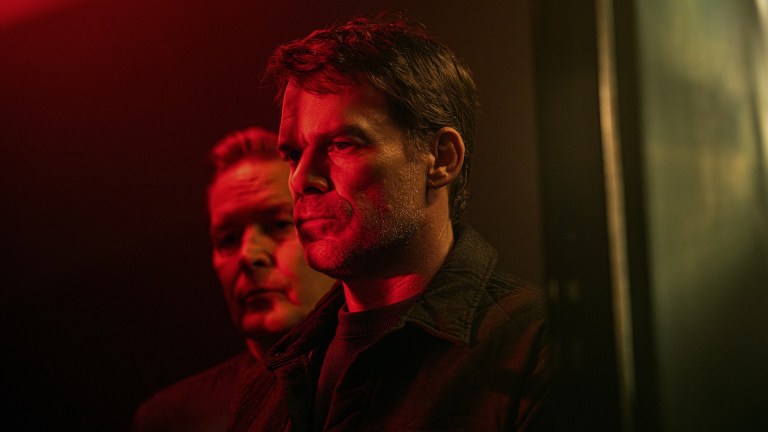Dexter: Resurrection Breaks Harry’s Code in One Major Way
Dexter Morgan has always struggled with the Code of Harry. Dexter: Resurrection elevates his rule-breaking to a new level.

This article contains spoilers for Dexter: Resurrection episodes 1 and 2.
When Dexter first began airing in 2006, few would have expected the serial killer drama to produce such an enthusiastic fan base as to allow for nearly two decades of episodes in its wake. Since then, more than just this critic have wondered how much Dexter was too much Dexter. Still, it’s clear that Showtime will continue to lay out a table for Michael C. Hall to operate on until every storytelling avenue has been exhausted. The only way this works is if the writers find ways to evolve Dexter Morgan’s personality and purpose while maintaining the traits that make him such an iconic TV presence.
Dexter: Resurrection received a lot of pre-release publicity due to the enormous number of Hollywood veterans who will make appearances throughout the season (everyone from Uma Thurman to Peter Dinklage). All of those famous talents don’t make a difference if Dexter is the same old monotone killing machine that he was previously. The series must examine how its lead character has changed through all of these murders, villains, and spinoffs that take the timeline from his birth years to the present.
The most recent spinoff, Dexter: Resurrection, understands this task pretty well in its first two episodes. Dexter survives the supposedly fatal shooting he suffered at the end of Dexter: New Blood at the hands of his son, Harrison (Jack Alcott). Now residing in New York City, he doesn’t waste any time when he hears about a serial killer who is taking out ride-share drivers around the city nicknamed “The Dark Passenger.” Dexter is offended that someone coincidentally stole his alter ego and, in the process, breaks a key part of his father’s code in one major way.
Dexter famously uses a Ten Commandments-style list of rules made by his father, homicide detective Harry Morgan (James Remar), to tame his morbid urges while allowing him to become violent when the time is right. According to the Code of Harry, Dexter must follow these guidelines when he hunts the bad guys.
- Don’t get caught
- Never kill an innocent
- Targets must be killers who have evaded the justice system
- Killing must serve a purpose, otherwise it’s just plain murder
- Blend in socially to maintain appearances
- Fake emotions and normality
- Control urges to kill and channel them
- Be prepared. Leave no trace or evidence
- Never make a scene, stay calm and collected
- Don’t make things personal because it clouds judgment
- Don’t get emotionally involved
- No preemptive killing
Dexter has always battled with the code throughout the original series and its spinoffs, but Dexter: Resurrection makes a major turn in regards to perhaps the most key aspect of the code – Rule 11: Don’t get emotionally involved. Dexter has slowly evolved into a much more grounded and thoughtful man as the years have passed. The death of his first wife, the birth of his son, the death of his sister, and the hardship of maintaining a fake identity in Dexter: New Blood all culminated in this moment. Dexter is still a killer, but he’s someone who has attached heroic motivations to his crimes. Add in that this show takes place in a Gotham-esque New York City, and you have the perfect recipe for Dexter transforming into a modern-day Batman.
The scene at the end of the second episode captures this point. Dexter knows he can’t kill the Dark Passenger in front of everyone on the street (see: Rule 9!), but he still prevents the serial killer from taking another person’s life. He stops the bad guy and tells him he’s about to board the ride-share car meant for himself. The Dark Passenger says sorry and boards the subway instead.
Harry immediately asks Dexter what he’s doing. He says stopping murders before they happen isn’t part of the code and puts Dexter at risk of getting caught. He’s using emotion to guide his actions, and he asks Dexter, “Since when do you care about other people?” Dexter answers, “since now.” This is a powerful and necessary adjustment in Dexter’s thinking that makes him a fascinating character study all these years later. It opens up this spinoff series in novel ways and gives it a chance to feel fresh instead of regurgitated.
Michael C. Hall’s chiseled face and mature presence in the series match Dexter’s newfound desire to be the good guy. His purpose for killing isn’t just to satisfy his violent hunger, but to give others a chance to live. Hall understands the moment and portrays Dexter’s heroic desires with a realistic tone and badass comic book aura. The only way this show was going to work was if the plot line recognized how long Dexter has been at this serial killer stuff and used his personal baggage to the story’s advantage.
He may not have Bruce Wayne’s wealth or cool suit, but Dexter now has the trauma and the canon to shed the antihero label and become the superhero he was meant to be. Batman with a little more blood, if you will. And if this process is done right, Dexter: Resurrection can make positive and lasting contributions to the character’s history instead of detracting from it.
The first two episodes of Dexter: Resurrection are available to stream on Paramount+ now. Both episodes will premiere to Showtime on Sunday, July 13 at 8 p.m. ET.
